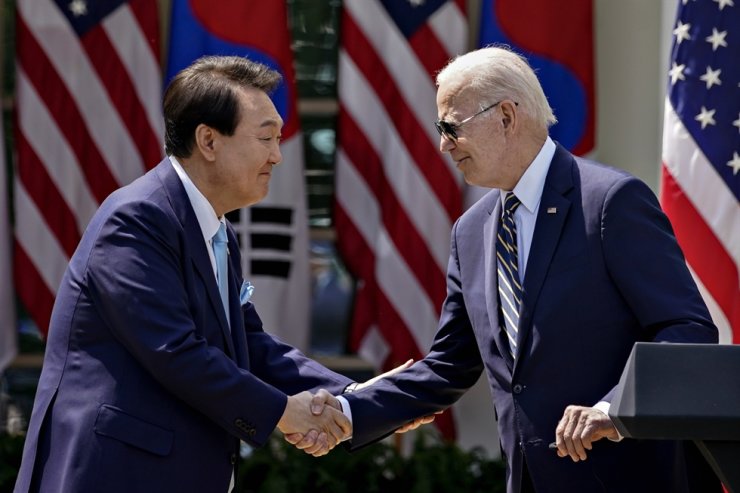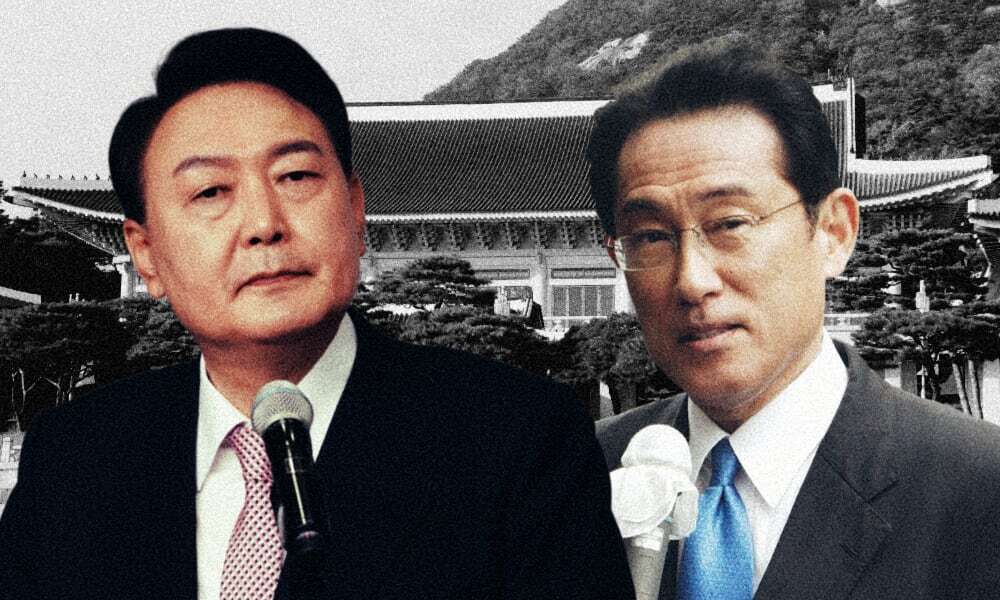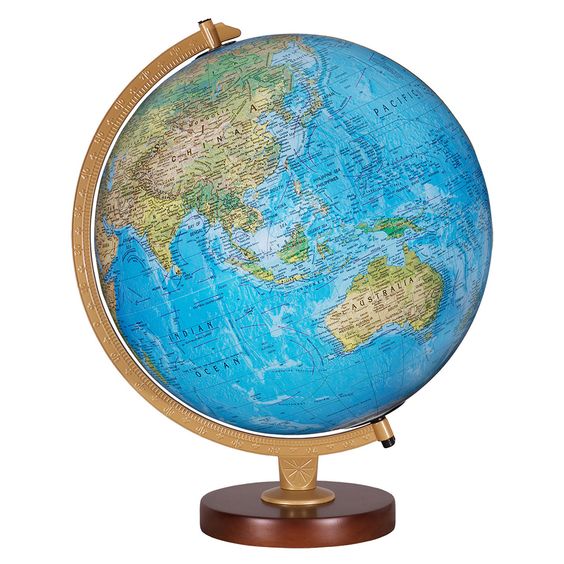
In Modern times it has been repeatedly applied. Possibly the most famous examples are Churchill and Stalin and Mao and Nixon
By Tom Arms
The well-worn phrase “The enemy of my enemy is my friend” has ancient roots. It dates back 7,000 years to the Sanskrit literature of India’s Vedas. The Romans and the Koran adapted it to their political needs.
In Modern times it has been repeatedly applied. Possibly the most famous examples are Churchill and Stalin and Mao and Nixon.
This weekend President Joe Biden will use the well-worn diplomatic axiom to try and persuade the leaders of South Korea and Japan that they should bury deep-rooted historical animosities to unite against the common enemies China, North Korea and Russia.
All three leaders will gather at Camp David on the edge of the Blue Ridge Mountains. They are expected to issue a communique agreeing to closer economic ties, intelligence sharing, a Tokyo-Seoul-Washington crisis hotline, a first ever joint statement of principles and trilateral military exercises.
What they will NOT do is agree to a formal treaty. Neither will Japanese Prime Minister Fumio Kishida formally apologize for Japanese atrocities committed before and during World War two.
 President Biden will use the well-worn diplomatic axiom to try and persuade the leaders of South Korea and Japan that they should bury deep-rooted historical animosities to unite against the common enemies China, North Korea and Russia
President Biden will use the well-worn diplomatic axiom to try and persuade the leaders of South Korea and Japan that they should bury deep-rooted historical animosities to unite against the common enemies China, North Korea and Russia
There are lots of good and obvious reasons for Japan and South Korea to be friends. Both of them are threatened by China and North Korea and, to a lesser extent Russia. From the US point of view there are 85,000 American troops costing an estimated $15 billion. Washington desperately wants Seoul and Tokyo to shoulder more of the burden.
The South Koreans and Japanese have the means to assume a bigger role but until recently have lacked the will. Japan is the world’s third largest economy and fourth largest military establishment. Fast-growing South Korea is not far behind, ranking 13th in the world GDP list and sixth on the size of its defense establishment.
Only 120 miles across the Sea of Japan separates the two countries, but only four percent of South Korea’s trade is with Japan. Its biggest trading partner is with North Korea’s protector China.
All the above explains why South Korean President Yoon Suk-Yeol has taken the initiative to mend broken fences with Tokyo. He recently invited Japanese Prime Minister Fumio Kishida to visit Seoul and on the 78th anniversary of Korean independence from Japan he described his country’s former colonial masters as “partners.”
However, Yoon’s pro-Japanese diplomacy has not gone down well with South Korean voters. A recent poll showed that 60 percent still distrust Japan and oppose closer relations.
There are reasons. In 1910 Japan invaded and annexed the Korean Peninsula. By the 1930s half the country’s agricultural land was owned by Japanese landlords and Japanese merchants controlled the country’s markets.
When Japan invaded Manchuria in 1931, Korea became the main thoroughfare for attacking Japanese troops. But the real problems started after Pearl Harbor. During World War Two an estimated two million Koreans were transported to Japan to work as slave laborers in Japanese factories. An estimated four million remained in Korea to work as slaves in mines and factories.
Perhaps the most emotive atrocity was the Japanese “recruitment” of the euphemistically named “comfort women”. They were, quite simply prostitutes. Up to 500,000 Korean women were forced into prostitution to satisfy the sexual needs of the Japanese army.
The Japanese have never apologized for these atrocities. In fact, many leading members of the ruling Liberal Democrat Party have complained that the South Koreans should be grateful for the roads, railways and factories that Japan built in Korea.
Kishida made a half-hearted attempt at an apology during his recent visit when he expressed “sympathy” for Korea’s “painful past.” His comment was attacked by parliamentary colleagues and dismissed by many South Koreans as a useless sop.
Kishida’s lack of support explains why most of the diplomatic running is being done by Presidents Yoon and Biden. Yoon is seriously worried about North Korea and China and accepts improvement of Japanese-Korean relations is a diplomatic necessity. His views lack public support, but he has another three and a half years until the next election whereas Kishida could face a snap poll at any time.
For Biden, a US-brokered rapprochement between America’s two closest allies in Asia would be a diplomatic coup. Donald Trump tried to achieve the same. He failed. This must make Biden’s success all the sweeter.
 World Review
World Review
Donald Trump will never see the inside of a prison. Neither will he be fitted for an orange onesie.
Not because he is innocent. Based on the evidence I have read to date, he is guilty as Hell. And I am sure a lot more will come out during the numerous trials he faces.
No, he will remain a free man for several reasons. One is that his lawyers will use every trick in their legal library to delay, delay, delay. They will appeal against the Washington venue for the trial there. They will also claim that the Washington judge is biased. The same with New York.
Their objections will be dismissed. But justice requires that they be heard and that takes time.
Next, there is the jury selection. One recent trial took several months to select the jury because they went through over a thousand potential jurors. In the case of Trump, the difficult is in finding 12 people in politically polarized America who do not have an opinion of the man and his election lie.
Even if a jury is selected, a venue is agreed for all four trials and impartial judges are found, there is a reasonable chance that a dedicated MAGA supporter will find their way onto a jury and block a guilty verdict. Unanimous jury decisions are required in American trials. That is a high bar for the Trump prosecutors.
Let us suppose he is found guilty on a felony charge in a court by a jury somewhere in America. The verdict is then likely to outrage and activate his MAGA base to such an extent that Trump wins the 2024 election. If that happens he will simply pardon himself and his many co-conspirators. The case in Georgia will be more difficult because he can only give pardons for federal crimes and Georgia is a state crime. But his highly paid lawyers should be able to find a loophole.
If they don’t, there is the appeal process. If Trump is found guilty he will appeal. The appeal process can extend for years, possibly up to and beyond Donald Trump’s allotted time on this Earth.
***
Spies, spies, everywhere—especially the Russians. Which is not surprising. They had a huge spy network in Tsarist days. It was massive under the Soviets and, of course, Vladimir Putin was a KGB agent in East Germany.
There is also the fact that Russia is at war, oops, I mean conducting a “special military operation” (SMO) in Ukraine. The SMO means that Russia needs intelligence on who in NATO is supporting what, when, where, how and why in Ukraine. Also, who they can support to espouse the Russian cause, scatter seeds of division and discontent and maybe even overturn a government or two.
And finally, if the war escalates, how best to attack NATO.
The latest alleged Russian spies to be uncovered are in Britain—three Bulgarians who appeared in court this week to be formally charged before their trial. This in itself, is unusual, usually spies are simply sent packing back to Moscow. Rarely are they imprisoned, which is the fate which awaits the Bulgarian Three if they are found guilty.
The UK is not the only target of the FSB and GRU (the two main intelligence agencies in Putin’s Russia). SVT Nyheter, a Swedish television investigative news program, reckons that at least a third of all Russian diplomats in Nordic countries are spies.
Nordic intelligence chiefs are also concerned about Russian fishing boats in the Baltic and North Sea. They claim that most of them are spy ships gathering information about wind farms and seabed communication links in case of war with NATO.
Earlier this month, three Russian spies were expelled from Germany. Poland broke up a 15-person spy ring. Finland booted out nine, Spain three. France, Italy, and the Netherlands have all recently expelled Russian diplomats for spying. The record, however, is currently held by tiny Moldova, which threw out 45 Russian diplomats who they accused of plotting a coup.
***
They were holding their breaths this week on the deck of the cargo ship the Joseph Schulte. The reason? The ship is a blockade runner.
It was not carrying guns. It was transporting Ukrainian grain–30,000 tons bound for hungry African mouths. To reach international waters from Odessa it had to pick its way through a Russian minefield and past Russian warships.
A month ago this was not a problem. Ukraine and Russia had a deal to allow ships carrying Ukrainian deal to pass through the Russian blockade. Then on July 17th Vladimir Putin scrapped the deal, started bombing and shelling Ukraine’s onshore grain storage facilities and threatened to do the same to any ship carrying Ukrainian grain.
In fact, Russian warships did fire warning shots across the bows of foreign ships trying to enter Ukrainian ports. The ships turned back.
This week Ukraine—and the captain and crew pf the Joseph Schulte–called Putin’s bluff. The Ukrainian navy guided them through the minefield towards the international waters of the Black Sea. They gambled on Putin’s good sense to protect them from an attack by a Russian warship. If Putin sinks a ship of a third country then he is effectively attacking that country’s territory. That is an act of war.
In the case of the Joseph Schulte, the Ukrainians were hedging their bets because the ship is Hong Kong registered which means it is Chinese. Russia relies heavily on Chinese diplomatic support. But what would happen if the ship was British, American or French?
***
Bidenomics is working. Or is it? Growth in the US is a healthy 2.6 percent—the best by far among the G7 countries. Inflation is 3.1 percent, down from 8.2 a year ago. Again, much better than most countries in the developed world.
Borrowings are extraordinarily high– $19.19 trillion dollars which represents a staggering 106 percent of the country’s GDP. However, most of the borrowed money is being spent on attracting foreign businesses and building the national infrastructure. So, in theory, the investments will result in increased tax revenues which will lower the public debt.
But there is a thorn in this rosy picture—people. Biden needs people to produce. Currently there are not enough of them. Unemployment levels are 3.5 percent which is to say that there is full employment in America. In fact, there is a labor shortage.
One of the key purposes of President Biden’s Inflation Reduction Act (IRA) was to attract foreign companies to build factories in America and bring American factories home. Sounds reasonable, but the factory owners are finding it difficult to find people to run them.
One sector that Biden wanted to encourage was the manufacture of computer chips. He passed the Chips Act alongside the IRA to tempt foreign companies. The world’s largest manufacturer of semi-conductors, the Taiwan Semi-conductor Manufacturing Company (TSMC), was tempted enough to invest $40 billion in a factory in Arizona.
But the TSMC can’t find the workers to even open it, let alone run it. The factory’s first chips were meant to roll off the production line next year. Launch date has now been put back to an iffy 2025.
Perhaps the TSMC will fare better in Dresden where EU incentives have encouraged them to invest $10 billion in a factory to build computer chips for Germany’s car industry. But, perhaps not, Dresden’s unemployment levels are 2.1 percent.
_______________
 Tom Arms is foreign editor of Liberal Democrat Voice. He is currently updating his “Encyclopedia of the Cold War” and co-hosts the world affairs podcast “TransAtlantic Riff” which could be heard by clicking here https://open.spotify.com/show/3ntjretAKNLZNFpA5ZEGDG
Tom Arms is foreign editor of Liberal Democrat Voice. He is currently updating his “Encyclopedia of the Cold War” and co-hosts the world affairs podcast “TransAtlantic Riff” which could be heard by clicking here https://open.spotify.com/show/3ntjretAKNLZNFpA5ZEGDG